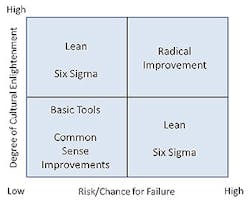In my last column for IndustryWeek, titled “Is Radical Improvement Worth the Risk?” I included a 4 block diagram that I did not address specifically.
I want to share a few insights as to the importance of understanding how this diagram may explain why some companies struggle with their lean and Six Sigma efforts.
Also, this 4 block may help explain why “Radical Improvements” are not on the radar screen of companies that are experiencing a difficult cultural environment.
Where is your company on the above 4 Block diagram? If the degree of “Cultural Enlightenment” is low, then the best bet for your company would be to focus on small, common sense improvements that really won’t have much impact unless they are numerous and long lasting. I mean, even the gruffest, meanest, dictator of a manager would have a difficult time arguing against moving the operator’s tools closer to their workstation to avoid non-value added walking time. However, many companies in the low degree of “Cultural Enlightenment” try to do more advanced improvements such as lean and Six Sigma and wonder why it fails or that the improvements are not sustained.
The companies that are culturally enlightened will not only have a much easier time of implementing the full scope of lean and Six Sigma, but they also position themselves to work on ideas that could be real game changers in their industry. I call these Radical Improvement ideas. There is still a high chance of failure that these ideas might not work. However, if even a few of these attempts are successful and causes a seismic shift in the customer experience so great that the company picks up significant market share, then these improvements will be worth the effort.
This reminds me of the quote from Thomas Edison when he was asked about all of the failed attempts to produce a light bulb:
“I have not failed 10,000 times. I have not failed once. I have succeeded in proving that those 10,000 ways will not work. When I have eliminated the ways that will not work, I will find the way that will work.” – Thomas Edison
So, a company that has low “Cultural Enlightenment” will wallow in the mud pit of mediocrity. While another company that is dedicated to improving their culture (Empowers their employees, encourages teamwork, drives out fear, is open to new ideas, partners with their suppliers, and develops a sense of pride and accomplishment), will not only have success with Lean and Six Sigma but could also realize a radical improvement that helps them dominate their market.
About the Author

John Dyer
President, JD&A – Process Innovation Co.
John Dyer is president of JD&A – Process Innovation Co. and has 32 years of experience in the field of improving processes. He started his career with General Electric and then worked for Ingersoll-Rand before starting his own consulting company.
John is the author of The Façade of Excellence: Defining a New Normal of Leadership, published by Productivity Press. He is a frequent speaker on topics of leadership, continuous improvement, teamwork and culture change, both within and outside the manufacturing industry.
John is a contributing editor for IndustryWeek, and frequently helps judge the annual IndustryWeek Best Plants Awards competition. He also has presented sessions at the annual IW conference.
John has an electrical engineering degree from Tennessee Tech University, as well as an international master's of business from Purdue University and the University of Rouen in France.
He can be reached by telephone at (704) 658-0049 and by email at [email protected]. View his LinkedIn profile here.

